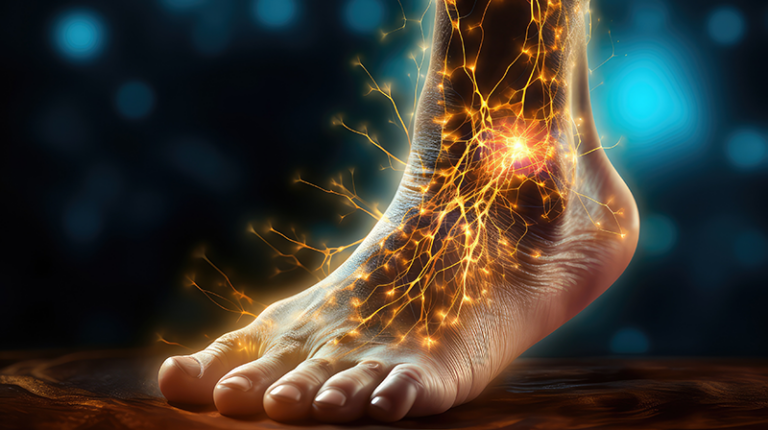
Neuropathy causes odd sensations, like tingling in your hands and feet, muscle weakness, and difficulty gripping objects. The pain can feel like a burn or stab, especially at night. Please don’t ignore these symptoms, as they may indicate serious conditions like diabetes.
Early diagnosis is important for treatment, including medication or lifestyle adjustments to control symptoms and prevent further nerve damage. If you have persistent tingling, weakness, or intense night pain, visit a doctor for your health.
Please don’t wait for it to worsen. Contact Momentum Medical for a neuropathy assessment and take the first step towards managing your symptoms. Your health can’t wait.
Neuropathy is when nerves get damaged. It can happen in many body parts. Nerve dysfunction describes it better than a single disease.
The symptoms vary widely. They depend on the affected nerves. Some people feel pain or numbness. Others may have muscle weakness or problems with balance.
Many things can lead to neuropathy, but diabetes is often the culprit. High blood sugar over time harms nerves, especially in your legs and feet.
Infections are also to blame sometimes. They can attack nerve tissues and cause lasting harm.
Genetics play a role, too. Inherited disorders make you more prone to nerve issues.
Neuropathy can cause sudden, sharp pain and make the skin so sensitive that even a blanket feels too heavy. This can mess with everyday activities.
Balance issues are common as well. Neuropathy can lead to a lack of coordination. This increases the risk of falls.
Neuropathy typically begins slowly with numbness in the hands or feet, which can extend to the legs and arms. People might feel a burning feeling in their limbs at night, making sleeping difficult.
Neuropathy affects more than just arms and legs; it impacts internal functions, too:
Digesting food becomes difficult for some people with neuropathy due to the effects on their autonomic nerves.
Maintaining a healthy lifestyle is crucial for nerve health and avoiding high blood sugar associated with diabetes. Drinking alcohol excessively can cause nerve damage, while poor eating habits can result in a deficiency of the nutrients that nerves require.
Furthermore, inadequate physical activity can increase the risk of nerve issues. Therefore, it is essential to stay active to keep your nerves and body healthy.
Neuropathy can stem from various underlying conditions, too:
These conditions create complications, sometimes leading to severe complications like weakness or loss of sensation.
When symptoms of neuropathy appear, they may grow worse without treatment. Numbness, tingling, and pain might not stay put. They can spread to more parts of the body over time. This progression often leads to chronic discomfort. It can make daily tasks hard.
People with these signs should see a doctor for help. The symptoms alone do not confirm neuropathy. But they are essential clues for doctors.
Blood tests are key first steps to diagnose neuropathies. These tests look for health problems that could hurt nerves, like diabetes or vitamin deficiencies.
Doctors also use imaging studies like MRI scans to find nerve damage in the body. These images show where and how nerves are hurt.
Another tool is nerve function tests such as EMG (electromyography). They measure electrical activity in muscles and nerves. This helps pinpoint the type of neuropathy a person has, such as mononeuropathy, which affects only one nerve.
For an accurate diagnosis, combining these methods is best.
If symptoms of neuropathy get worse, quickly seek immediate care to prevent severe complications.
When noticing new symptoms, consulting a healthcare provider early can help manage and prevent further nerve damage. Staying alert to changes in your condition is important for effective health management after a neuropathy diagnosis.
For personalized care and support in managing neuropathy, reach out to Momentum Medical, where health experts are ready to assist you in navigating your condition with expertise and compassion.
Peripheral neuropathy mainly affects the hands and feet but can also show symptoms in other areas if other nerves are involved.
Diabetes raises the risk of health problems, including lack of vitamins, alcohol misuse, weakened immune systems, infections, and exposure to toxins.
Doctors diagnose illnesses by examining you, looking at your health history, and doing tests like blood work and brain scans such as MRIs or CTs.
Serving Volusia, Flagler, Orange, Osceola, Hillsborough, Pasco, Pinellas, and Seminole county patients with back pain conditions, sports injury, work injury, headaches, lower back pain, auto accident injuries, neck pain and more.
Our staff can accommodate Spanish, French and Russian speaking patients. All other languages with enough notice we can schedule a translator.
Todas nuestras localizaciones tienen hablantes de español en el personal.
© 2024 Momentum Medical